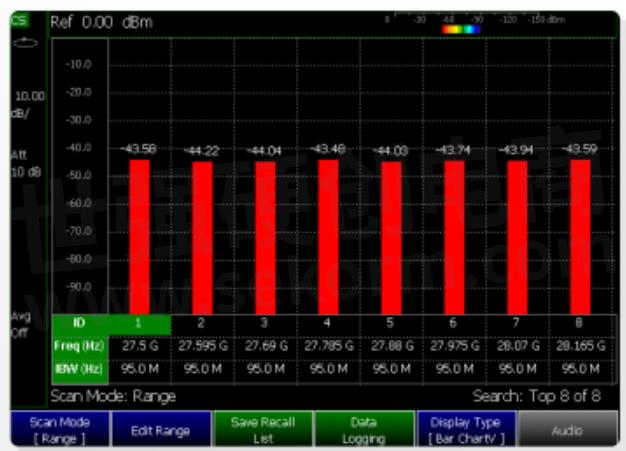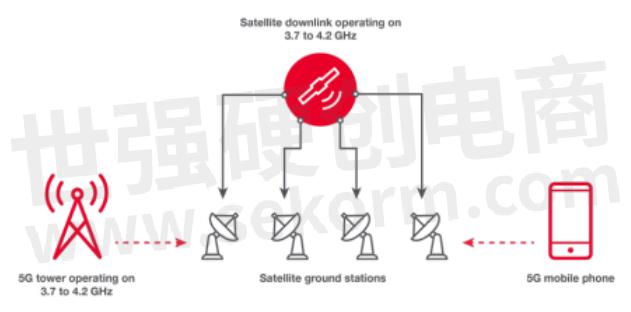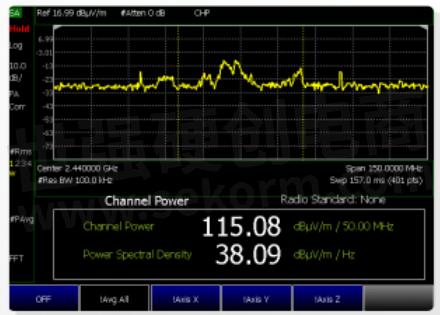6 Essential 5G Field Tests

5G impacts many industries, including wireless communications, aerospace, automotive, energy, and healthcare. With such a diverse spread of applications, accurate 5G field testing is crucial. Here are six essential field tests for 5G installation, verification, optimization, and troubleshooting using the FieldFox Handheld Analyzer.
PATH LOSS CHARACTERIZATION
New technology births new challenges to overcome. Path loss characterization is one of the unique challenges stemming from 5G technological advances. Unlike the steady physical properties of cabled systems, the calibration of 5G testing methods is complex and has many barriers fighting against it. As mmWave signals propagate, these barriers cause a high loss in power density, known as path loss. Understanding the path loss of a telecommunications system is critical for determining all the gains and losses experienced by a signal sent from transmitter to receiver.
To characterize path loss in the deployment environment, you need a FieldFox device acting as the transmitter and another as a receiver. The transmitting FieldFox uses built-in continuous waveform generator capabilities and a gain horn antenna. Paired with another antenna, the receiving FieldFox performs spectrum analysis to measure the signal strength. FieldFox saves the data with GPS and timestamp information so you can load the data into planning software.
BASE STATION COVERAGE TESTING
Since 5G uses massive multiple-input, multiple-output (MIMO), and beamforming technology, phased array antennas are necessary (Figure 1). Coverage testing of 5G base stations — also called Next Generation Node B (gNB) — requires a spectrum analyzer or scanning receiver equipped with a phased array antenna. Due to the nature of beamforming, simply logging geolocation points is not sufficient, and signal power data must be collected as well.

Figure 1. Depiction of 5G NR beamforming and beam sweeping
To perform gNB coverage tests, FieldFox controls the measuring beam and utilizes a phased array antenna as an RF probe. By sweeping the beam, FieldFox captures and logs three data points: azimuth, elevation, and amplitude. The built-in GPS receiver also records geolocation information. FieldFox can generate a heat map, display the polar antenna patterns, or perform a boresight scan.
COMPONENT CARRIER POWER MEASUREMENTS
If a base station is not transmitting at optimal power, it affects coverage and neighboring cells. Because of these effects, telecommunications companies — especially those deploying and maintaining 5G — must verify component carrier power levels in the field. This verification helps pinpoint faulty towers, enabling coverage optimization and preventing power from leaking into neighboring frequency bands.
FieldFox can perform over-the-air (OTA) component carrier power measurements in Channel Scanner mode, as shown in Figure 2. Monitoring up to 20 channels with customizable frequency and bandwidth settings, FieldFox offers a simple way to measure power levels from different LTE and 5G base stations in a single measurement.

Figure 2. Component carrier power measurements captured using a FieldFox
OTA CONTROL CHANNEL INTERFACE TESTING
With an ever-increasing number of wireless technologies, many opportunities for interference have been introduced. For instance, 5G base stations can create interfering signals for nearby satellite ground stations, as depicted in Figure 3. When sending critical communications such as emergency radio messages, 5G control channel signal interference could lead to disaster. Additionally, adjacent cells can cause interference between each other. Interference in the control channel can bring the whole cell site down. A solution in your field kit capable of capturing interference signals and visualizing control channels is essential for field deployment.

Figure 3. 5G radio tower and mobile phone interfering with satellite ground station communications
FieldFox in Real-Time Spectrum Analysis (RTSA) mode facilitates cell search and displays beam sweep signals when paired with the phased array antenna. You can see interfering or transient signals and measure beam performance from this display. FieldFox is compatible with Keysight's Spectrum Monitoring Software, which offers spectrum monitoring, logging, and management, plus interference detection and location.
NETWORK QUALITY AND BEAM PERFORMANCE VERIFICATION
When transitioning to 5G, operators must verify the quality of their network and beam performance so users can connect without issue. To properly verify the network, you need a solution capable of reading and displaying important metrics from several base stations in the vicinity. These metrics include channel power, signal quality, Synchronized Signal Block (SSB) index, and frequency error from various base stations.
FieldFox has built-in measurements for LTE frequency division duplex (FDD) and 5G NR that provide key performance indicator (KPI) metrics. Using both 5G NR and LTE FDD modes helps optimize network coverage for 5G and determine 5G coverage versus LTE coverage in a particular area.
EMF EXPOSURE EVALUATION
The characteristics of 5G signals require more base station antennas than LTE. In addition, 5G mmWave signals have different electromagnetic field (EMF) properties than previous standards. Because of this, to meet compliance standards, operators will have to verify EMF exposure levels.
Various RF and microwave networks — such as mobile phones, base stations, Wi-Fi, smart meters, IoT devices, and satellite and radar systems — create EMF radiation. Spectrum Analyzer (Figure 4) and 5G NR OTA modes on FieldFox support EMF measurements.

Figure 4. EMF measurements made using FieldFox in Spectrum Analyzer mode
CONCLUSION
With a frequency range of up to 54GHz and bandwidth up to 120MHz, check out FieldFox Handheld Analyzer for all your field testing needs.
- +1 Like
- Add to Favorites
Recommend
- Keysight FieldFox Handheld Microwave Analyzer Speeds Installation of 5G, Radar and Satellite Communication Systems
- Keysight FieldFox Handheld Analyzers Now Supports EMI Pre-Compliance Measurements
- A New Method for Early Breast Cancer Detection: Handheld RF Analyzers
- Keysight Introduces Software-Defined Handheld Analyzer N9912C
- Keysight Technologies Acquires Quantum Benchmar, Augmenting Keysight‘s Quantum Portfolio
- Keysight First to Gain GCF Approval of Cases for Validating 5G New Radio mmWave Devices in Standalone Mode
- Keysight and Transphorm Create Power Supply Reference Design that Lowers Product Costs; Speeds Time to Market
- Handheld Spectrum Analyzer Function
This document is provided by Sekorm Platform for VIP exclusive service. The copyright is owned by Sekorm. Without authorization, any medias, websites or individual are not allowed to reprint. When authorizing the reprint, the link of www.sekorm.com must be indicated.






























































































































































































































































































































































































































































































































































































































































































































































































































































































